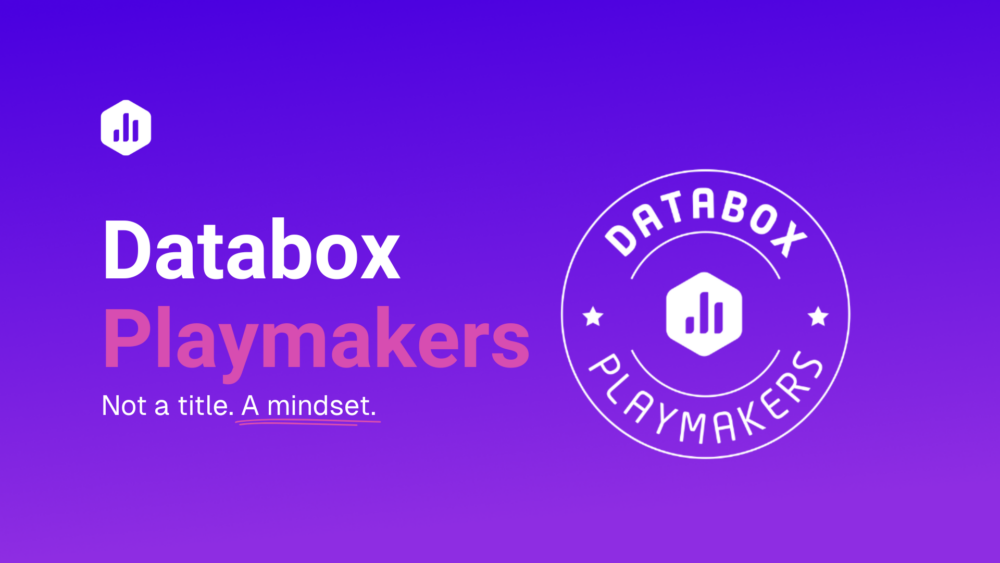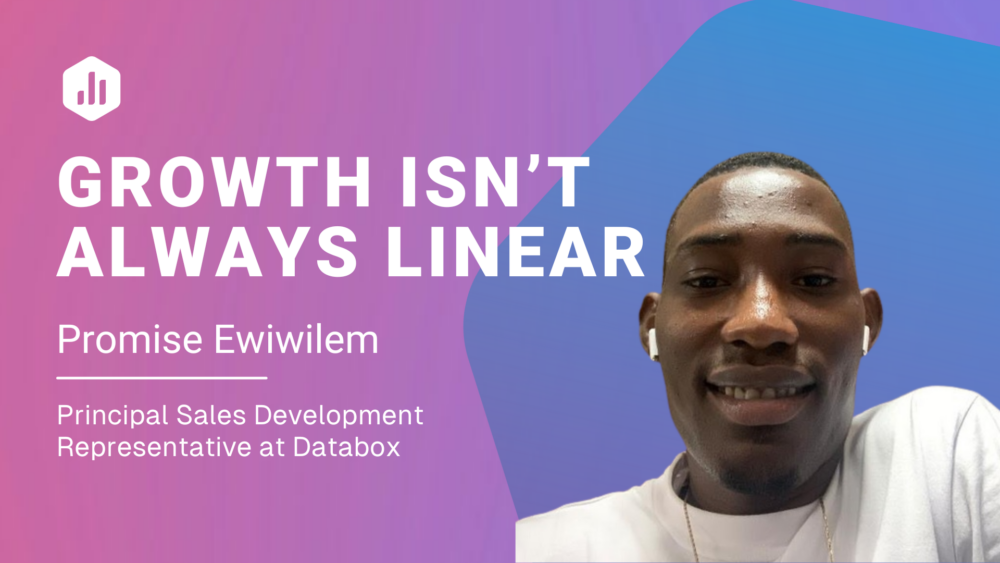Table of contents
In Playmaker Spotlight, we get up close (and sometimes personal) with one of many of our valuable team members, whose individual contributions shouldn’t be overlooked but rather used to highlight their unique experiences. Besides taking this excellent opportunity to share their accomplishments with the world, we also hope to provide you with insider info about our team culture and what it’s like to work at Databox.
As businesses generate more data than ever before, the demand for data-driven insights continues to grow. The ability to collect, analyze, and interpret data has become essential in making informed decisions that drive business performance. Data empowers companies to identify trends, predict outcomes, and make strategic choices that enhance efficiency. By enabling businesses to track key performance indicators from various sources in one place and compare their data to industry benchmarks, they are able to make data-driven decisions.
Over the last year, Databox started to invest heavily in data engineering and data science initiatives. We believe this is crucial for our success and the success of our customers, especially in the rapidly evolving landscape of AI trends, and we are committed to staying at the forefront of this trend. Our Data Science team is at the heart of this effort, responsible for designing and implementing data solutions to address complex business problems. Their expertise lies in analyzing and extracting valuable insights from data, providing our customers with the tools they need to make sense of the vast amounts of information they generate daily.
We had the privilege of sitting down with Aleksej Miloševič, one of our brilliant product scientists and a member of this team. In this exclusive interview, Aleksej shares his background, the role and objectives of our Data Science team, the challenges they face, and how his personal experience at Databox has contributed to his career growth. Furthermore, he dispels common myths about data science, offering a fresh perspective on this exciting field.
Join us in this Playmaker Spotlight as we delve into the world of data science and gain valuable insights from Aleksej’s expertise.
Aleksej holds a master’s degree in Information and Communication Technologies from the University of Maribor, and his expertise lies at the intersection of software design and data science.
Q: Aleksej, can you tell us about your background – why did you focus on two distinct but complementary areas of your study, and how does this relate to your work?
I find the study of software design appealing because it allows me to think about solutions to problems in terms of systems and their operating context. I enjoy the challenge of engineering systems that are easy to maintain, extend, and comprehend. The field of Data Science is particularly exciting to me due to the vast amount of data a typical system collects. With modern procedures and processes, we can gain valuable insights and solve complex problems previously deemed unapproachable. Data Science equips us with the tools necessary to create procedures that solve business problems, and the system design principles guide the structure of such systems. In my experience, I am most productive when I have the opportunity to combine these two areas.
Q: What led you to your current role as a data scientist at Databox?
I started at Databox as a backend engineer, responsible for developing and maintaining the application services that enable the user-facing portion of the application to function. As our product evolved and our customers’ needs changed, there was a growing demand for deeper data insights. This led to the creation of the Data Science team, and I was fortunate enough to join the team right from the beginning. My relevant experience and familiarity with the Databox mission and technological platform made me a natural fit for the role.

Q: Your current role today is Product Scientist. Can you tell us more about that?
As a Product Scientist, my primary responsibility is to lead the Data Science team in providing users with the necessary tools to gain insights into their business metrics beyond raw data. This entails working with Product teams to identify data-related problems users face and developing suitable solutions that go beyond the tooling provided by the original data source. Identifying the best solution can be challenging and requires experimentation, and we engage in lively internal discussions following each experiment. We then proceed to design and implement systems that other teams can utilize to deliver value to our users. Finally, we monitor the system’s effectiveness and take appropriate action based on feedback.

Q: As mentioned, you’re a part of the Databox Data Science team, a multi-disciplinary group of experts responsible for designing and implementing data-driven solutions to business problems. Could you explain briefly what you and your team do in Databox?
As a part of the Databox Data Science team, our mission is to help our clients tackle their business problems by designing and implementing data-driven solutions. Our work is challenging and exciting as we handle large amounts of data and transform it into meaningful insights that drive business decisions.
Our daily tasks range from cleaning and preparing data for analysis to using statistical and machine-learning methods to identify patterns and relationships in data. We also build statistical and machine learning models and engineer services that allow our internal teams to consume the insights derived from these models easily.
But our job doesn’t end there. Collaboration with other teams is key to understanding both organizational and technical problems. By bringing together experts from various disciplines, including data analysis, machine learning, data engineering, and software engineering, we can develop effective solutions that deliver value to our customers.
Our team is passionate about leveraging data to drive business growth, and we take pride in our ability to deliver impactful results.
Q: The Data Science team’s work is fascinating and highly challenging. In addition to the technical aspects of your work, you have a broader goal to provide our users with meaningful insights into their data. What part of your job do you enjoy the most?
The work we do as a part of the Data Science team is nothing short of thrilling and incredibly demanding. Besides the technical aspects of our roles, we aim to achieve a more extensive goal of providing our users with meaningful insights into their data. I find every part of my job fascinating, but if I had to choose, I’d say that what I enjoy the most is the versatility of my role. As a member of a multidisciplinary team, I get to assume the role of detective, architect, organizer, and builder – all within the scope of a single project. Each function comes with its unique set of challenges that I love to solve. On a day-to-day basis, I take pleasure in coming up with the best possible solutions within the constraints given to me. But what I value most is the opportunity to contribute to shaping our data strategy to provide our customers with even deeper insights into their data.

Q: What would you say is the most challenging part of the goal you are working towards right now?
Working with various data source types and their corresponding metrics is one of our team’s most significant challenges at Databox. To provide our users with the most comprehensive insights possible, our models must be flexible enough to handle diverse inputs. This means running extensive experiments with various models, analyzing their performance, and making the necessary adjustments to optimize their effectiveness.
On a more macro level, we’re also proud to contribute to shaping Databox’s overarching data strategy, which aims to empower our users with deeper insights into their data. We believe that data alone is not enough and that the real value lies in the insights it can provide. Our team strives to help our users make informed decisions by providing them with actionable insights and clear visualizations. Ultimately, we want our users to feel confident and empowered when making data-driven decisions.
Q: Anything specific you’re working on right now that you can share more with us? We know just recently, Databox published the first set of features powered by the Data Science team.
Absolutely! I’d be delighted to provide a sneak peek into our ongoing projects.
One of our exciting endeavors is the development of a Forecasting feature. This powerful tool utilizes advanced statistical models to predict future trends for any metric. Our main challenge is ensuring the model’s reliability across various metrics, not just a select few. We’re dedicated to refining the model’s adaptability and versatility, making it robust enough to handle diverse data types and distributions. To enhance its usability, we’re also working on providing a range of forecasts, from pessimistic to optimistic, to help users understand the uncertainty associated with predictions.
Another focus area for us is Anomaly Detection. This feature lets users receive real-time alerts if a metric exhibits unexpected behavior. Not only does this help in identifying unusual trends, but it also enables users to proactively address potential issues before they escalate. We’re actively fine-tuning the sensitivity of this feature, striking the right balance between detecting true anomalies and avoiding false alarms.
Moreover, we’re delving into advanced techniques to calculate the correlation coefficient between business metrics. This exploration aims to unveil subtle relationships that standard correlation measures might overlook, providing deeper insights into the dynamics of the business.
Additionally, we’re harnessing the potential of Generative Models to provide our users with a comprehensive understanding of their data. By adding valuable context to metric performance, we empower users to gain deeper insights. Our commitment to innovation drives us to constantly seek new ways to maximize the impact of our data science capabilities, delivering even greater value to our users.
Q: Data Science is a rapidly growing field becoming increasingly important in today’s data-driven world. What do you wish everyone would know about Data Science and its applicability?
Data Science is a fascinating and dynamic field that plays an integral role in today’s data-driven world. One of the most important aspects of data science is data quality. Without high-quality data, any insights or conclusions drawn from the data may be inaccurate or misleading. Identifying and fixing the sources of errors and inconsistencies is essential before attempting to derive insights. In other words, “Garbage in, garbage out.” Therefore, ensuring data quality is a critical first step toward gaining meaningful insights to help organizations make data-driven decisions.
Q: However, some misconceptions surrounding the field still need to be addressed. Maybe there are any myths we can bust about Data Science and Data Scientists?
One of the most common myths is that Data Scientists spend most of their time building statistical and machine-learning models. While this may be true for a small subset of professionals in larger organizations, the reality is that Data Scientists wear many hats.
In addition to building models, Data Scientists spend significant time collecting and cleaning data, conducting exploratory data analysis, building visualizations, and communicating insights to stakeholders. They may also work on engineering tasks, building and maintaining machine learning software systems.
It’s essential to understand that Data Science is a collaborative effort that involves cross-functional teams with expertise in data analysis, statistics, machine learning, data engineering, and software engineering. By working together, these teams can effectively extract insights from data and deliver value to their organizations. So the myth that Data Scientists work alone in silos is just that – a myth.

Q: Would you say your role at Databox challenged you to grow professionally?
Working at Databox has been instrumental in my career development as a data scientist, providing unique technical challenges and opportunities for growth. The company’s mission to make performance monitoring and analysis accessible to everyone has led to a diverse range of data source types and metrics, creating a complex yet exciting environment to work in.
One of the most valuable aspects of my work at Databox has been the level of ownership and responsibility I have been given over multiple projects. This has allowed me to grow as a professional and gain a deeper understanding of how significant components of a system are tied together to deliver business value. I enjoy the multifaceted nature of my role, taking on various roles within a single project and coming up with creative solutions to complex problems.
However, building robust models that perform well on a wide range of inputs is a significant challenge we face in the data science team. With dozens of metrics each data source supports, we must identify suitable models through experimentation, evaluation, and collaboration. This process has provided me with opportunities to work closely with software and data engineering experts and to hone my skills as a data scientist.
For example, I have worked on projects involving data collection and cleaning, exploratory data analysis, building visualizations, and communicating with stakeholders. These experiences have given me a deeper understanding of the various components of delivering meaningful insights and contributed to my growth as a data scientist at Databox.

Q: Any advice for future Data Scientists and prospective Databox Playmakers?
As someone who has worked in the data science field, my advice for future data scientists and prospective Databox candidates is to focus on building a strong foundation in the fundamentals. It can be tempting to jump right into the latest technologies or trends, but a solid understanding of the basics will make it much easier to learn and adapt as the field evolves.
I recommend mastering design patterns, data structures, and algorithms for software engineering. These fundamental concepts will help you design systems that are maintainable, scalable, and correct, no matter what language or framework you’re using.
In the field of data science, a strong grasp of statistics and probability is essential, as well as proficiency in a programming language with a robust statistics package, such as Python. Machine learning is also becoming increasingly important as more organizations seek to harness the power of data to drive insights and decision-making.

Remember, the field of data science is constantly evolving, so it’s important to stay curious and continue learning throughout your career. My personal motto is to be comfortable with being uncomfortable. This means that willingness to step out of your comfort zone is essential for personal and professional growth. Trying new things, even if they may be challenging, can help you become more comfortable with change and better adapt to new situations. By continuously expanding your skill set and showing your eagerness to learn and adapt, you can advance your career or explore new opportunities you may not have considered.
At Databox, our mission is to help millions of businesses worldwide leverage data to improve their performance by making it easy to discover actionable insights that drive better, faster, and more confident decision-making. We believe that data science is key to unlocking the potential of data and driving growth and innovation in businesses of all sizes.
If you’re a goal-oriented, committed, and curious team player, we invite you to join us in building the future of business performance.














